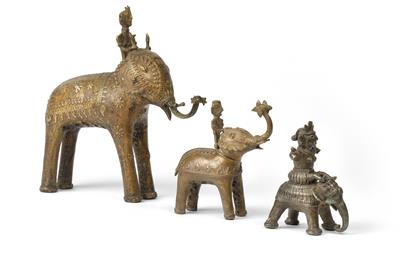Mixed lot (3 items): India: Three ‘Bastar bronzes’ in the form of three elephants with riders (probably local deities).
Mixed lot (3 items): India: Three ‘Bastar bronzes’ in the form of three elephants with riders (probably local deities).

The elephants are decorated with rich, ceremonial ornaments, in the same way in which they are adorned during real ritual processions. The arms of the smallest elephant’s rider are broken.
H: c. 60 cm, 11 cm and 10 cm. (ME)
Provenance: German Private Collection.
In isolated rural regions of India, especially where the non-Hindu tribes (‘Adivasi’) live, wandering founders travel from village to village and manufacture such charming sculptures, upon request, for these tribes. This is the case, for instance, in the villages of the Indian federal states of Orissa, Bihar, Maharashtra, Bengal and others. The small works of art are named after one of these tribes and are an important branch of Indian arts and crafts. The individual pieces are first of all moulded from beeswax and then produced with yellow cast-alloy (brass) in ‘waste mould’ (also known as ‘cire perdue’ casting). Hence, each ‘Bastar bronze’ is an original piece.
additional picture:
‘Bastar bronzes’: An Indian wandering founder at work in one of the tribal villages in Orissa.
Photo from ‘Cire Perdue Casting in India’ by Ruth Reeves
Esperto: Prof. Erwin Melchardt
 Prof. Erwin Melchardt
Prof. Erwin Melchardt
+43-1-515 60-465
erwin.melchardt@dorotheum.at
26.05.2015 - 15:00
- Prezzo realizzato: **
-
EUR 500,-
- Stima:
-
EUR 800,- a EUR 1.000,-
Mixed lot (3 items): India: Three ‘Bastar bronzes’ in the form of three elephants with riders (probably local deities).
The elephants are decorated with rich, ceremonial ornaments, in the same way in which they are adorned during real ritual processions. The arms of the smallest elephant’s rider are broken.
H: c. 60 cm, 11 cm and 10 cm. (ME)
Provenance: German Private Collection.
In isolated rural regions of India, especially where the non-Hindu tribes (‘Adivasi’) live, wandering founders travel from village to village and manufacture such charming sculptures, upon request, for these tribes. This is the case, for instance, in the villages of the Indian federal states of Orissa, Bihar, Maharashtra, Bengal and others. The small works of art are named after one of these tribes and are an important branch of Indian arts and crafts. The individual pieces are first of all moulded from beeswax and then produced with yellow cast-alloy (brass) in ‘waste mould’ (also known as ‘cire perdue’ casting). Hence, each ‘Bastar bronze’ is an original piece.
additional picture:
‘Bastar bronzes’: An Indian wandering founder at work in one of the tribal villages in Orissa.
Photo from ‘Cire Perdue Casting in India’ by Ruth Reeves
Esperto: Prof. Erwin Melchardt
 Prof. Erwin Melchardt
Prof. Erwin Melchardt
+43-1-515 60-465
erwin.melchardt@dorotheum.at
|
Hotline dell'acquirente
lun-ven: 10.00 - 17.00
kundendienst@dorotheum.at +43 1 515 60 200 |
| Asta: | Arte Tribale |
| Tipo d'asta: | Asta in sala |
| Data: | 26.05.2015 - 15:00 |
| Luogo dell'asta: | Wien | Palais Dorotheum |
| Esposizione: | 20.05. - 26.05.2015 |
** Prezzo d’acquisto comprensivo dei diritti d’asta acquirente e IVA
Non è più possibile effettuare un ordine di acquisto su Internet. L'asta è in preparazione o è già stata eseguita.
